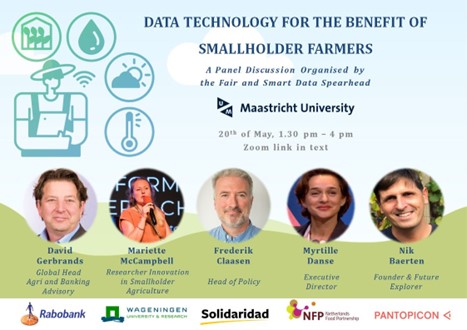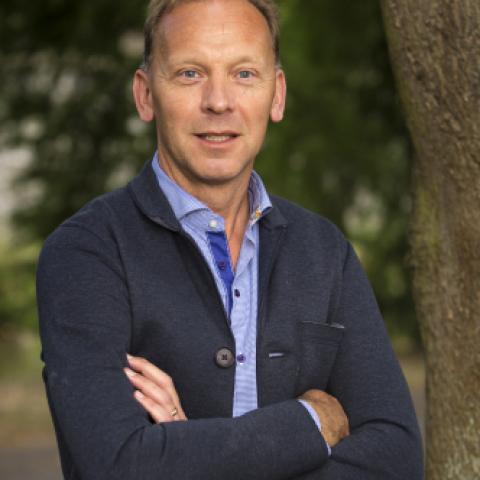Interview: Ron Cörvers, Programme Lead, Fair and Smart Data Spearhead
− 7 min readRon Cörvers who leads one of the UM/SBE research spearheads - Fair and Smart Data speaks with Ton Geurts, Business Director, BISCI and Shreyas Sridhar, Project Manager, BISCI about his experience with research and leading the Maastricht Sustainability Institute.
Shreyas: Hi Ron, thank you for joining Ton and myself here today. The Fair and Smart Data spearhead is an ambitious project and as its Programme Lead, we are eager to get to know you better and talk to you about the project itself. Shall we start with a quick introduction and background?
Ron: Definitely. Thank you for having me here today. I am Ron Cörvers, Programme Lead of the Fair and Smart Data spearhead – subtitle: the Currency for Global Sustainability. Additionally, I am Associate Professor Governance and Sustainable Development at the Maastricht Sustainability Institute, where I also served as the Scientific Director from May 2013 until January 2022.
I studied Geography and History in my bachelor’s and then completed my master’s study in Environmental Geography at Radboud University Nijmegen. Soon after my master’s I joined Open University, a well-known institute for distance education, where I worked for over 20 years.
In 2007 I joined the Maastricht Sustainability Institute (MSI, formerly known as ICIS) as an Associate Professor on a part-time basis along with my appointment at Open University. In 2013, I was offered the role of Scientific Director of MSI, which was a new challenge that I was happy to accept. In this role, in addition to the management of the institute I've involved myself in research and teaching.
From my work at Open University and MSI I would say I'm a social scientist who has always been keen to work with people from various disciplines. This is quite fascinating for me to do because then you see different ideas and unique perspectives.
Ton: You put your experience well in your humble words. I know that you also did your PhD while working, which must have been quite a task.
Ron: Indeed. A PhD is necessary if you are interested in a career at university. When I was working at Open University we saw great research opportunity for the Ministry of Environment and Spatial Planning and decided to take on the task. So yes, combined with my course development activities and teaching I did my PhD for one/two days a week, and in my private time. It took some perseverance and rigour but everything you do with passion is possible.
Ton: We have always seen you have the eagerness and capability to build bridges and to bring together a team. Which is evident from how MSI has grown over the years. How did this growth happen?
Ron: Since my start at MSI I was involved in the management team trying to build a strategy for the institute, and when I was offered the role of Scientific Director of MSI I had some strong ideas of how we should develop the institute in the field of research and education. We developed a vision and together with MSI staff we worked hard to pave the way for the future of the institute.
Initially MSI was purely a research institute. We felt that having a master’s programme Sustainability Science within the institute was important in terms of knowledge dissemination from research to education, and of course also spread the name of the institute. An education programme also added a new revenue stream and this reduced the burden of having to look for project funding for our research.
So, with this idea we started the master programme Sustainability Science, Policy and Society which has since 2011 grown from 10 students to approximately 120 students currently. More students also mean more staff. In the last 10 years, the institute has more than doubled in size.
Ton: That is great to hear indeed. This growth and as MSI part of Maastricht University, it has contributed significantly by infusing sustainability into the DNA of the university. Which is also clear from SBE’s “Vision 2025”.
Shreyas: The growth of the institute is very impressive. The university is well known in the Netherlands and Europe, do you also have international students joining the programme?
Ron: Indeed. 20% of the students are from the Netherlands and 40% from other European countries. The rest (circa 20) are from all over the world, so that is a great achievement that we can be truly proud of.
After their study with us, almost half of the alumni end up in the private sector in small scale start-ups but also large multinationals in sustainability roles. The rest of the students start working at various NGOs and in the public sector. Approximately 10% of the students start a PhD.
Ton: How does MSI contribute to the sustainability goals of the university?
Ron: Next to my teaching and research role, I am also the Project Owner “Education” in the Sustainable UM2030 Programme, which started in 2018. This is where we try to place sustainability as one of the central pillars of all faculties and service centres at UM. This is an ongoing task and time consuming, but with an enthusiastic team we are making progress. A good example is the UM-wide minor Sustainability, which is developed by an enthusiastic interfaculty teaching staff team. As a starting point we spoke to over 60 people within UM from Directors to support staff to understand where the gaps were in education that we could fill in. We also surveyed bachelor students to understand their eagerness and interest in sustainability.. This year was a pilot with 35 students and next year we will open this up to more students at bachelor’s level.
Shreyas: That is fantastic. So, the Fair and Smart Data spearhead, how did this journey start?
Ron: I met Ton at an event in SBE where we had presentations from various departments and we got to speak with each other. Ton explained a little bit about BISCI and how they were working on supply chain innovation in sustainability and digitisation. In another event at Brussels, I met Dominik Mahr and we had a chat about how we could bring in sustainability knowledge to develop something bigger. At the same time there was a call at SBE for three spearhead projects. Initiated by Ton we met Jeroen Douglas and Han Brouwers from Solidaridad Network and consequently with Jeroen Helmer and Emma van der Ven from Rabobank, and together with BISCI, MSCM, MSI, DAD and MSM it became the foundation of the spearhead.. The common ground was that we wanted to work on a project with societal relevance, in short: how can we improve the living conditions and livelihood assets of smallholder farmers in the Global South by using data-technologies, new business models, and good governance of global supply chains. We put our ideas into a project proposal which was granted by SBE.
The partners in this spearhead also represent different aspects of society; we have academic institutions, innovation hubs, NGOs and business. (Follow link to read more about the spearhead: https://www.maastrichtuniversity.nl/research/fair-and-smart-data-currency-global-sustainability)
Ton: FSD is indeed an important project and leading such a large programme is not an easy task. You have the experiences to lead and work with different kinds of external parties and different departments within the business school. Making this a well-oiled machine takes time and effort.
Ron: Yes, on the one hand there is a huge challenge involved in this and on the other hand the work we do is also extremely rewarding. This brings in new ideas, new relationships and that is a good way forward.
Shreyas: Ron, hopefully for our society and its smallholders’ the benefits of the spearhead will be reaped. To wrap up, what keeps you motivated to do this?
Ron: An interesting thing about sustainability is that it's very difficult to say what it is. You can call it a path towards creating a better world in terms of society and the environment. And I feel I can contribute to such a change. This is what keeps my motivation high. The sense of doing research for a better world and teaching young talents to contribute to a liveable planetis already very motivational.
You can also see this with the FSD spearhead, the ambition is to create a better world for the smallholder farmers in most vulnerable parts of this planet. I think there's also a role for universities, not only to assist people who can afford it but also the ones who need assistance. That’s what we are trying to achieve through this spearhead.
As part of the spearhead and to spread the word on the work that is done we organise a panel discussion titled “Data technology for the Benefit of Smallholder Farmers”.
Register through the following link: https://maastrichtuniversity.zoom.us/webinar/register/WN_pM557hiAR_OUVMHkEww23A


